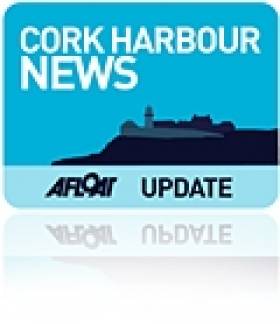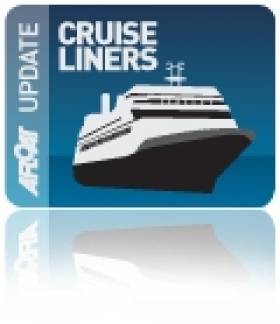Displaying items by tag: Canary Islands
The Irish Whale and Dolphin Group (IWDG) says it has confirmed its first humpback whale match between Ireland’s waters and the Canary Islands.
Images of a fluke and dorsal fin captured by Alex Brenner at Valle Gran Rey on La Gomera were, with the help of Nick Massett, compared with those of a humpback photographed by IWDG member Simon Duggan at Baltimore in early December 2012.
“On matching the images we can confirm that this is indeed the same individual #HBIRL21, whom we’ve not recorded in Irish waters over the interim nine years,” the IWDG says.
The development marks an important new connection between Ireland and the Spanish island chain off north-west Africa, following earlier links confirmed with key humpback whale breeding grounds off Cape Verde further south.
#nmci – The National Maritime College of Ireland (NMCI), in Cork harbour, is the lead partner in the delivery of the Canary Island's first Offshore Survival Training Centre. A ceremony to mark the partnership will be held in Las Palmas on Friday next, March 27th, hosted by Conor Mowlds, Head of the NMCI, in the presence of the Spanish Minister for Industry, Energy and Tourism, Jose Manual Soria, and Ireland's Honorary Consul in Gran Canaria, Victor Aúz Castro.
The NMCI and SEFtec, one of the world's leading suppliers of offshore simulation equipment and training support consultancy, are the lead consultants and manufacturers for the design, manufacture, development and operation of the Grupo Stier Training Centre in Las Palmas. Expertise from the NMCI and SEFtec have combined to support the development and operation of this centre and are now recognised as world leaders in the sector.
Simon Coveney, TD, Minister for Marine, Agriculture and Defence said, "This is a fantastic example of how Ireland's public and private maritime sectors can work together to deliver manufacturing and consultancy services overseas, creating jobs and revenue for the country and promoting Irish niche-sector expertise on a global platform."
Grupo Stier, who will operate the Offshore Survival Training Centre, have had a presence in the Canary Islands since 1994. Its training arm, Centro de Estudios Marítimos del Atlántico (CEMA) offers practical and innovative training for the next generation of maritime professionals based on the island. For over 20 years CEMA has developed and delivered various programmes, and activities, with an emphasis on maritime studies. The company has trained more than 2,500 alumni from all over the world.
"This project is one of the most exciting we have been involved in, the professionalism and focus of the Group Stier Team is truly impressive and the location of the Training Centre is unequalled. We have committed the full resources and expertise of the NMCI in support of this fantastic initiative and we are proud to be associated with both Group Stier and the Canary Islands" says Conor Mowlds, Head of the NMCI (& MD SEFtec NMCI Offshore Ltd.)
"The NMCI is to the fore in maritime research in Ireland, making it a global leader," said Sean Sherlock, TD, Minister of State for Development, Trade Promotion and North-South Co-operation at the Department of Foreign Affairs.
"Our goal is to further develop a thriving maritime economy, enabling economic growth and creating jobs in our ocean economy. The work of the NMCI complements that goal. Projects like this in the Canary Islands strengthen international bonds and relationships that will lead to even further advancement in the years to come."
The Centre will be located in the Puerto de Taliarte, on land leased to it through a co-operation agreement with the Cabildo de Gran Canaria: it will be completed by April and fully operational by September 2015 providing approved offshore survival training in support of the Canaries growing offshore industry.
Ida Stier, CEO Grupo Stier said: "After 20 years providing training services in the shipping market, Grupo Stier is very excited to develop this project with the support of NMCI, SEFtec and the Cabildo/City Hall de Gran Canaria, as this will give the opportunity to train local people for the offshore business and will contribute to the Islands in the development of the offshore industry."
"It is always exciting to work with ground breaking companies who are willing to introduce new products and services" said Darren O'Sullivan, Director SEFtec, "It is my strong belief that the Canaries and the Oil gas sector will benefit greatly from Grupo Stiers investment and vision"
Five Die In Canary Island Cruise Ship Lifeboat Drill
#CruiseLiners - The Guardian reports that five crew members on a British-operated cruise liner in the Canary Islands have died after a lifeboat fell 17 metres from the side of the ship and overturned during an emergency drill.
The crew - believed to include Indonesians, a Filipino and a Ghanaian - are thought to have been on board the lifeboat as it was being lowered from the vessel at the time of the incident.
Lifeboat launch drills are notorious for accidents, according to seafarers' union Nautilus International, who added that "there's been research which suggests that more people are dying in lifeboat drills than are being saved by lifeboats."
The Canary Islands are a popular holiday destination for people from Ireland and all over Europe seeking some winter sunshine. Reports say 2,000 passengers were on the cruise ship at the time but none were involved in the emergency drill.
The Guardian has much more on the story HERE.

























































